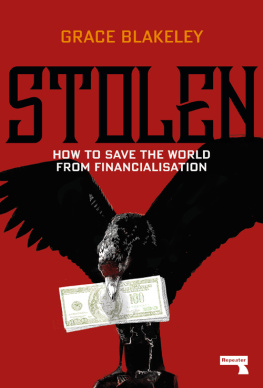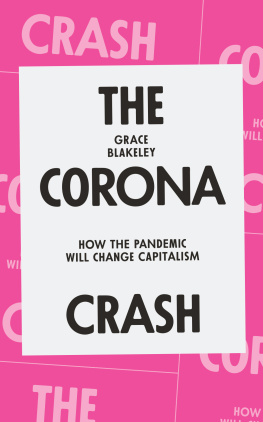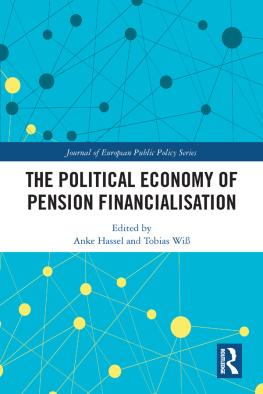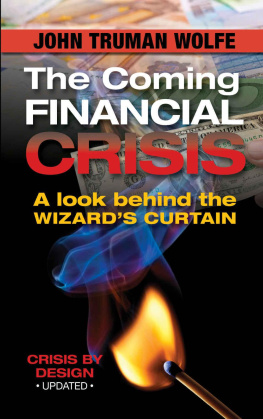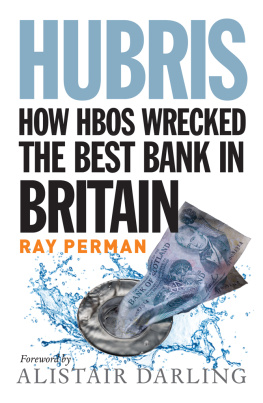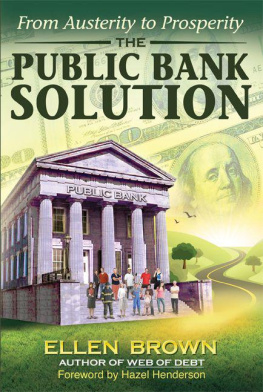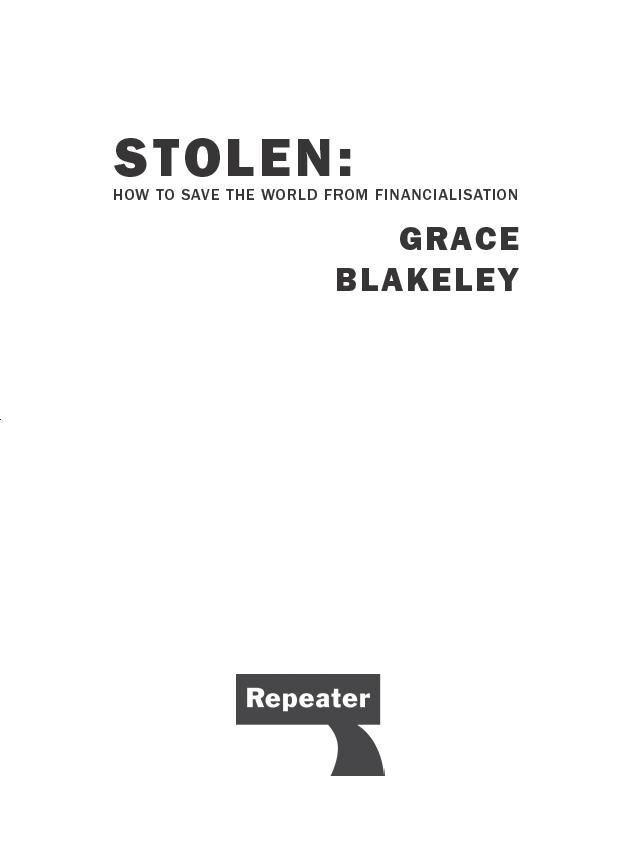CONTENTS
Chapter One
The Golden Age of Capitalism
Chapter Two
Vulture Capitalism:
The Financialisation of the Corporation
Chapter Three
Let Them Eat Houses:
The Financialisation of the Household
Chapter Four
Thatchers Greatest Achievement:
The Financialisation of the State
Chapter Five
The Crash
Chapter Six
The Post-Crisis World
Chapter Seven
The Way Forward
For my grandad, who taught me what it means to be a socialist, and my grandma, who taught me that only strong, intelligent, stubborn women have ever changed the world.
Youll go down if you dont stand up for yourself Surely you see that.
Brecht
INTRODUCTION
Before 2007 the last time there was a run on a British bank the Austro-Hungarian Empire was preparing for war with the Prussians, and the thirty-seven states of the USA had just agreed to free the countrys slaves. In 1866, Overend, Gurney and Company the bankers bank found itself in serious financial difficulties. Caught up in the euphoria of the industrial revolution, the bank had lent too much to the UK railway industry, fuelling a speculative boom that spread the length and breadth of the country. But when the bubble burst, the bank found itself with a stack of unpayable debts. Overend appealed to the Bank of England for financial assistance, but its pleas fell on deaf ears. Queues started forming outside the banks headquarters at 65 Lombard Street, and within a week the Panic of 1866 had taken hold of the country.
141 years later, the panic of 2007 was just beginning as Northern Rock, the largest mortgage lender in the UK, found itself unable to access funding. Northern Rocks business model was based on the securitisation of mortgage loans turning mortgages into financial securities that could be traded on capital markets. It borrowed from other financial institutions over short-time horizons often on an overnight basis and lent long, issuing mortgages that wouldnt mature for decades. When financial markets started to seize up in 2007, banks stopped lending to one another, and the Rock found itself unable to access international capital markets, meaning it couldnt pay its debts. On 13 September 2007, the news broke that Northern Rock was seeking emergency support from the Bank of England: the first UK bank run since Overend.
Both bank runs resulted from an asset bubble one in railways, the other in housing. Both Northern Rock and Overend relied on borrowing from financial markets to finance their day-to-day liabilities. Both were eventually forced to appeal to the Bank of England for help. But there were also some critical differences between the two institutions. Overend lent money to companies that were building the UKs railway networks: the same railway networks that we use to this day. They may have done so on unwise terms, but they had invested in the expansion of the productive capacity of the economy in our ability to produce things, both then and in the future. Northern Rock was doing no such thing. A former building society, Northern Rock lent consumers money to buy already-existing homes. It had been criticised for approving mortgages with incredibly high loan-to-value ratios; on occasion the bank granted mortgages worth 125% of the propertys value. Rather than creating assets, Northern Rock was creating debt. And it was doing so on an unsustainable scale.
The contrast is puzzling. If it was so unproductive, then why was Northern Rock bailed out when Overend, Gurney and Company was allowed to fail? It is true that by 2007 the Bank of England had become the UKs official lender of last resort, with a responsibility to support ailing banks if their demise might threaten the stability of the financial system. But this raises more questions. How had a small former building society become so important that its demise could have brought the booming British finance sector to its knees? When did the UKs finance sector became so large, and so powerful, that a single bank could extract billions from the taxpayer under the threat of economic meltdown? In other words, when did finance become such a dominant and dangerous force in our society?
This book argues that, since the 1980s, the UK has entered a new phase of its economic history. Once the workshop of the world, today our main connection to the global economy comes from the City of London, a global centre for financial speculation. This transformation has not been slow and steady it has occurred in fits and starts, as the economy has lurched from one crisis to the next, adapting under the influence of the powerful at each stage. Our current economic model finance-led growth can be traced back to the 1980s, when a new system emerged out of the ashes of the post-war social-democratic order. Since then, British politics and economics, as in the US and a string of other advanced economies, has become financialised, with results that were not apparent until the crisis of 2008.
The best-known definition of financialisation is that it involves the increasing role of financial motives, financial markets, financial actors and financial institutions in the operation of the domestic and international economies.
When economists talk about financialisation, they usually point to the United States, which, in absolute terms, is home to the largest finance sector on the planet. Other economies that pursued this model before 2007 include Iceland and Spain, and today Australia and Canada are perhaps its most enthusiastic adopters.
The most obvious indicator of financialisation is the dramatic increase in the size of the finance sector itself. Between 1970 and 2007, the UKs finance sector grew 1.5% faster than the economy as a whole each year. Overall, by 2007, the UK had one of the largest finance sectors in the world relative to the real economy.
But financialisation cant be reduced to the increasing importance of big banks in the functioning of the economy. Its not as though capitalism has been taken over by finance. Instead, every aspect of economic activity has been subtly, and sometimes dramatically, transformed by the rising importance of finance in the economy as a whole. Whereas economic life for the individual was once centred around wages and wage bargaining, now the management of debt has gained importance. Businesses once focused primarily on producing the goods and services for which they had a competitive advantage, but today they are likely to place just as much if not more focus on their share price, their dividends regime, their borrowing and the bets theyve made on exchange rates and interest rates. There was a time when state borrowing was constrained by restrictive monetary policy; today states are not only able to borrow far in excess of what they earn, they are also able to have private corporations undertake their spending on their behalf.
Historically, its advocates have argued that capitalism makes everyone better off by creating wealth for everyone. Businesses make profits, and they invest these profits in future production. This creates jobs, which raise living standards for the majority of the population. Such a system might lead to rising inequality in the short term but, as entrepreneurs reinvest their profits, eventually this wealth will trickle down to everyone else. Whilst this has always been an optimistic reading of the way capitalism works, during the post-war period it often appeared to reflect reality (at least in the global North). But finance-led growth upsets the channels through which wealth is supposed to trickle down from rich to poor, and it does so in obvious ways. Investment slows, wages fall, and profits especially financial profits boom.

